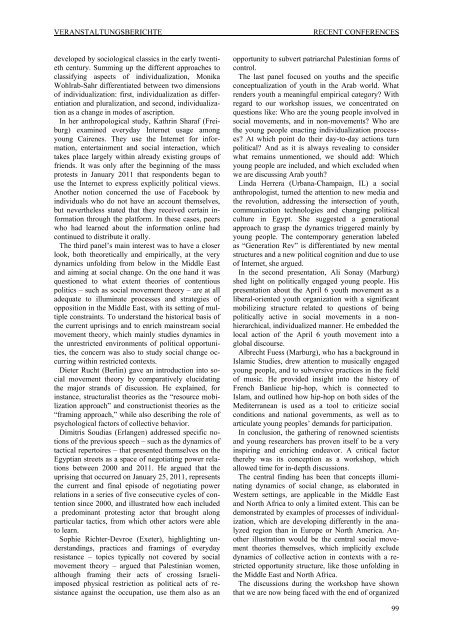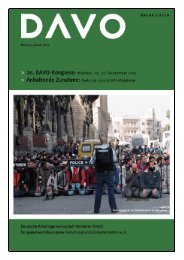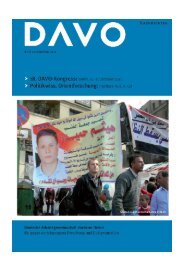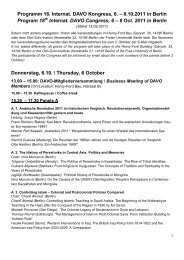4 Dissertationen und Habilita- tionen / Dissertations and Habilitations
4 Dissertationen und Habilita- tionen / Dissertations and Habilitations
4 Dissertationen und Habilita- tionen / Dissertations and Habilitations
Sie wollen auch ein ePaper? Erhöhen Sie die Reichweite Ihrer Titel.
YUMPU macht aus Druck-PDFs automatisch weboptimierte ePaper, die Google liebt.
VERANSTALTUNGSBERICHTE RECENT CONFERENCES<br />
developed by sociological classics in the early twentieth<br />
century. Summing up the different approaches to<br />
classifying aspects of individualization, Monika<br />
Wohlrab-Sahr differentiated between two dimensions<br />
of individualization: first, individualization as differentiation<br />
<strong>and</strong> pluralization, <strong>and</strong> second, individualization<br />
as a change in modes of ascription.<br />
In her anthropological study, Kathrin Sharaf (Freiburg)<br />
examined everyday Internet usage among<br />
young Cairenes. They use the Internet for information,<br />
entertainment <strong>and</strong> social interaction, which<br />
takes place largely within already existing groups of<br />
friends. It was only after the beginning of the mass<br />
protests in January 2011 that respondents began to<br />
use the Internet to express explicitly political views.<br />
Another notion concerned the use of Facebook by<br />
individuals who do not have an account themselves,<br />
but nevertheless stated that they received certain information<br />
through the platform. In these cases, peers<br />
who had learned about the information online had<br />
continued to distribute it orally.<br />
The third panel’s main interest was to have a closer<br />
look, both theoretically <strong>and</strong> empirically, at the very<br />
dynamics unfolding from below in the Middle East<br />
<strong>and</strong> aiming at social change. On the one h<strong>and</strong> it was<br />
questioned to what extent theories of contentious<br />
politics – such as social movement theory – are at all<br />
adequate to illuminate processes <strong>and</strong> strategies of<br />
opposition in the Middle East, with its setting of multiple<br />
constraints. To <strong>und</strong>erst<strong>and</strong> the historical basis of<br />
the current uprisings <strong>and</strong> to enrich mainstream social<br />
movement theory, which mainly studies dynamics in<br />
the unrestricted environments of political opportunities,<br />
the concern was also to study social change occurring<br />
within restricted contexts.<br />
Dieter Rucht (Berlin) gave an introduction into social<br />
movement theory by comparatively elucidating<br />
the major str<strong>and</strong>s of discussion. He explained, for<br />
instance, structuralist theories as the “resource mobilization<br />
approach” <strong>and</strong> constructionist theories as the<br />
“framing approach,” while also describing the role of<br />
psychological factors of collective behavior.<br />
Dimitris Soudias (Erlangen) addressed specific notions<br />
of the previous speech – such as the dynamics of<br />
tactical repertoires – that presented themselves on the<br />
Egyptian streets as a space of negotiating power relations<br />
between 2000 <strong>and</strong> 2011. He argued that the<br />
uprising that occurred on January 25, 2011, represents<br />
the current <strong>and</strong> final episode of negotiating power<br />
relations in a series of five consecutive cycles of contention<br />
since 2000, <strong>and</strong> illustrated how each included<br />
a predominant protesting actor that brought along<br />
particular tactics, from which other actors were able<br />
to learn.<br />
Sophie Richter-Devroe (Exeter), highlighting <strong>und</strong>erst<strong>and</strong>ings,<br />
practices <strong>and</strong> framings of everyday<br />
resistance – topics typically not covered by social<br />
movement theory – argued that Palestinian women,<br />
although framing their acts of crossing Israeliimposed<br />
physical restriction as political acts of resistance<br />
against the occupation, use them also as an<br />
opportunity to subvert patriarchal Palestinian forms of<br />
control.<br />
The last panel focused on youths <strong>and</strong> the specific<br />
conceptualization of youth in the Arab world. What<br />
renders youth a meaningful empirical category? With<br />
regard to our workshop issues, we concentrated on<br />
questions like: Who are the young people involved in<br />
social movements, <strong>and</strong> in non-movements? Who are<br />
the young people enacting individualization processes?<br />
At which point do their day-to-day actions turn<br />
political? And as it is always revealing to consider<br />
what remains unmentioned, we should add: Which<br />
young people are included, <strong>and</strong> which excluded when<br />
we are discussing Arab youth?<br />
Linda Herrera (Urbana-Champaign, IL) a social<br />
anthropologist, turned the attention to new media <strong>and</strong><br />
the revolution, addressing the intersection of youth,<br />
communication technologies <strong>and</strong> changing political<br />
culture in Egypt. She suggested a generational<br />
approach to grasp the dynamics triggered mainly by<br />
young people. The contemporary generation labeled<br />
as “Generation Rev” is differentiated by new mental<br />
structures <strong>and</strong> a new political cognition <strong>and</strong> due to use<br />
of Internet, she argued.<br />
In the second presentation, Ali Sonay (Marburg)<br />
shed light on politically engaged young people. His<br />
presentation about the April 6 youth movement as a<br />
liberal-oriented youth organization with a significant<br />
mobilizing structure related to questions of being<br />
politically active in social movements in a nonhierarchical,<br />
individualized manner. He embedded the<br />
local action of the April 6 youth movement into a<br />
global discourse.<br />
Albrecht Fuess (Marburg), who has a backgro<strong>und</strong> in<br />
Islamic Studies, drew attention to musically engaged<br />
young people, <strong>and</strong> to subversive practices in the field<br />
of music. He provided insight into the history of<br />
French Banlieue hip-hop, which is connected to<br />
Islam, <strong>and</strong> outlined how hip-hop on both sides of the<br />
Mediterranean is used as a tool to criticize social<br />
conditions <strong>and</strong> national governments, as well as to<br />
articulate young peoples’ dem<strong>and</strong>s for participation.<br />
In conclusion, the gathering of renowned scientists<br />
<strong>and</strong> young researchers has proven itself to be a very<br />
inspiring <strong>and</strong> enriching endeavor. A critical factor<br />
thereby was its conception as a workshop, which<br />
allowed time for in-depth discussions.<br />
The central finding has been that concepts illuminating<br />
dynamics of social change, as elaborated in<br />
Western settings, are applicable in the Middle East<br />
<strong>and</strong> North Africa to only a limited extent. This can be<br />
demonstrated by examples of processes of individualization,<br />
which are developing differently in the analyzed<br />
region than in Europe or North America. Another<br />
illustration would be the central social movement<br />
theories themselves, which implicitly exclude<br />
dynamics of collective action in contexts with a restricted<br />
opportunity structure, like those unfolding in<br />
the Middle East <strong>and</strong> North Africa.<br />
The discussions during the workshop have shown<br />
that we are now being faced with the end of organized<br />
99





